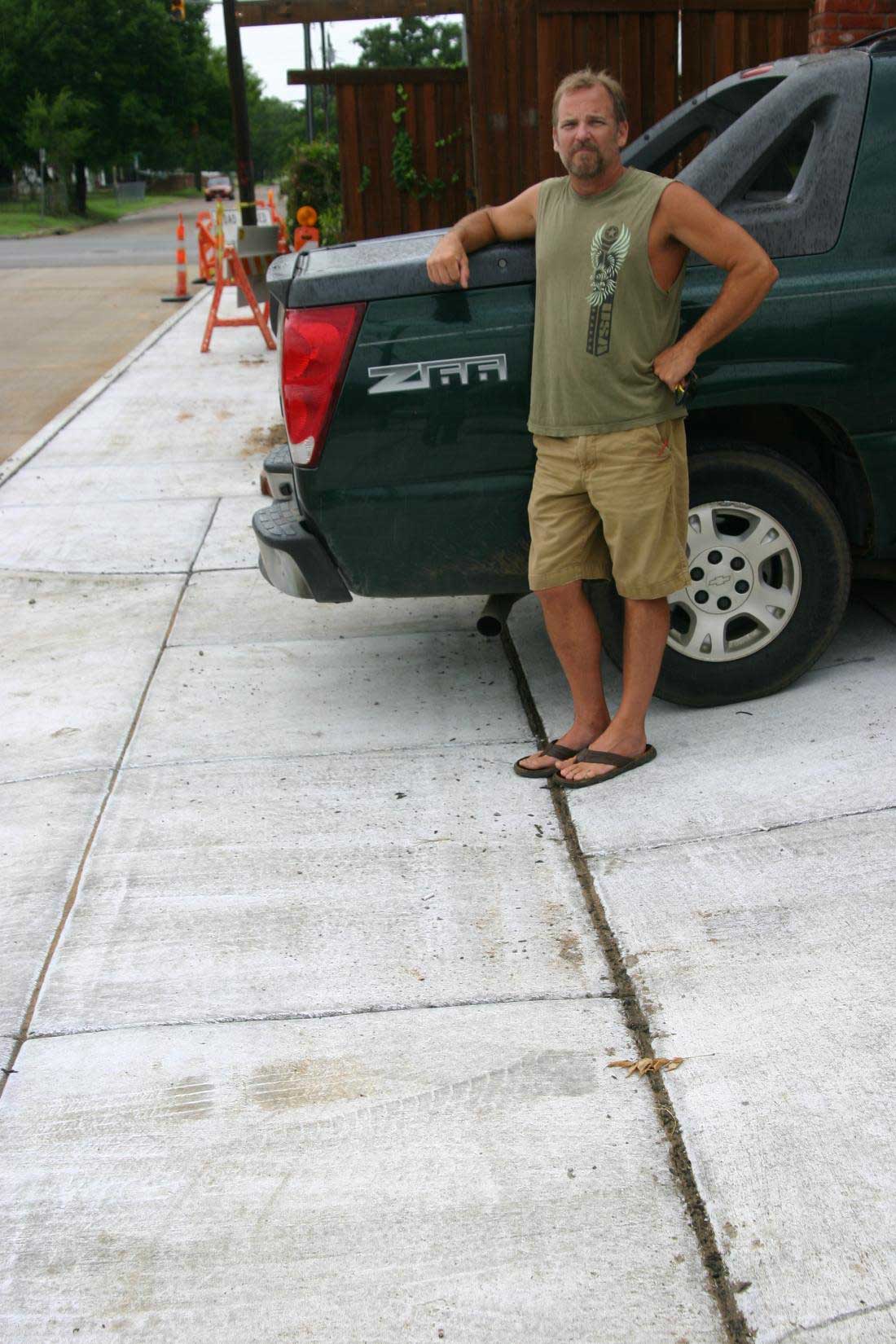Brian Bentley has been sparring with Fort Worth officials for months over a mammoth elm tree that was cut down in his yard without permission (“Nightmare on Elm’s Street,” May 29, 2013). A city-contracted crew cut through the tree’s roots while widening Cleckler Avenue. Figuring the tree had been permanently damaged, the crew cut it down and hauled it off, even though the tree was on Bentley’s property and he hadn’t given anyone permission to do that.
Before that dispute was settled, Bentley found himself embroiled in another clash with city officials. He owns a rental property a block away on Bird Street and was surprised to find a street crew had poured sidewalks alongside his house and three of his neighbors’ houses. But rather than build the sidewalks on the city’s right-of-way, they were built on the homeowners’ property.
“I got no notice from the city on anything,” he said.
Worse, construction of the new sidewalk meant Bentley’s driveway was shortened to the point that a mid-sized vehicle could no longer park there legally. A city ordinance prohibits parking in a manner that obstructs use of a sidewalk. Police can ticket vehicles that jut into the sidewalk.
Bentley figures it’s easier and cheaper for the city to build sidewalks on private properties without asking permission or compensating property owners and then deal with problems afterward.
“Why do their engineers draw the plans this way?” he said. “They intentionally did it. It was no mistake.”
Another homeowner lost part of his yard and driveway to the sidewalk as well. His driveway is still long enough to accommodate his car, but C. J. Silva doesn’t appreciate the city building something on his property without permission.
Silva recently spoke with a city employee who was overseeing the Bird Street construction, and the employee said the crew was planning to cut down a big tree. Silva asked which tree, and it turned out to be the one in his front yard. The crew had already spray-painted the tree with two big Xs to mark it for demolition.
Silva complained about not being notified and noted that the tree was on private property. The city employee told him that a contractor had received permission from the property owner to cut down the tree.
“That conversation never took place,” Silva said.
Silva demanded to speak to the contractor who claimed to have gotten his permission. The contractor, when confronted by Silva, backtracked on his story, Silva said.
Silva and Bentley say city engineers appear to design and build new sidewalks on private property because they can usually get away with it.
“They encroached on our property,” Silva said. “They didn’t offer any money.”
Encroachment without compensation would probably not happen in more expensive neighborhoods, he said. Houses in his Riverside neighborhood are mostly owned by elderly white people or young Hispanic families; some of the latter group lack legal citizenship or the ability to speak English, he said.
Silva thinks the city takes advantage of that.
City spokesman Bill Begley said the street crew checked with Bird Street property owners about the sidewalk project and received “positive responses.”
However, two of the four property owners — Bentley and Silva — are angry about the work. Fort Worth Weekly was unable to talk to the owners of the other two properties. One owner, an elderly woman, answered a knock on her door but refused to speak to a reporter. The other owner, also an elderly woman, did not answer her doorbell on three separate visits by a reporter. Her driveway was greatly shortened by the new sidewalk, making it impossible for cars to legally park in her driveway.
Bentley’s garage was built in 1940, and his driveway stretched 15 feet from the garage door to the property line. But the sidewalk shortened the driveway by several feet.
Bentley’s friend and business partner, Robert Chesser, complained to the contractor immediately after the new sidewalk was poured in June. The contractor became snippy, Chesser said, and told Chesser that his crew could remove the concrete driveway completely, leaving nothing but dirt, and then nobody could legally park there.
Chesser, a retired Fort Worth police officer, told the contractor he was out of line. He recounted the conversation to Bentley, who called the city and made arrangements to meet with a city engineer. The engineer promised to tear up the driveway and sidewalk and then re-pour the driveway at its original size (and at the city’s expense).
“I spent two hours at city hall to deal with this,” Bentley said.
The work was done last week.
“We accommodated his request and reconstructed the portion of sidewalk and driveway that was resulting in the parking issue,” Begley said. “The total cost of reconstruction was less than $600 and was done at the property owner’s insistence.”
Begley did not respond when asked whether the city purposely designs infrastructure improvements on private property without approval from property owners.
Meanwhile, Bentley is still butting heads with city officials over the huge American elm tree that was removed from his front yard without permission. Bentley’s survey shows the tree was entirely on his private property and the city had no right to cut it down.
City officials say the tree was partly in the city’s right of way, but they have provided little supporting evidence.
Bentley and his wife, Lancine, are savvy homeowners. They are founding members of the Carter-Riverside Neighborhood Association, and Lancine was the group’s first president. Bentley has served on various city commissions, including the Fort Worth Board of Adjustment. He’s also a member of Denton’s planning and zoning commission and tree preservation committee, while Lancine is Denton’s Code Enforcement Division program manager.
They know about city codes and property rights, and they’ve stood up to what they see as Fort Worth’s efforts to trample the rights of residents in a modest Eastside neighborhood.
Bentley asked the city to pay him $13,496 for the destroyed elm, based on figures that the city uses to fine developers who improperly cut down trees — $400 per caliper inch. A city official offered to plant two small trees on Bentley’s property as long as Bentley signed a release against any further liability for the city.
Bentley refused.
The city later offered to plant three small trees in his yard. Bentley still wasn’t impressed. The elm tree was an estimated 100 years old and beloved by neighbors for the massive amount of shade it provided during the summer.













JEFF PRINCE – Can you contact me please. We are having identical issues with the city. Would like for you to bring this issue to the attention of the Fort Worth population as the city is constantly abusing its power even when being notified prior to the issue.